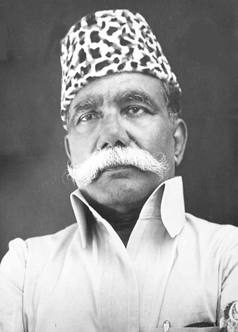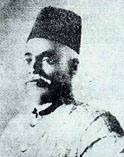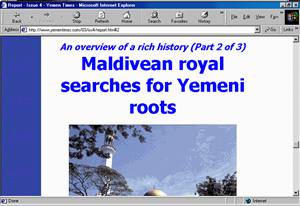
Bodufenvalhugey Seedi aged 72 |
In
about 1830, the teen-age King Siri Kula Sudha Ira Siyaaka Saasthura
Audha Keerithi Bovana (Sultan Mohamed Imaduddine IV) had to elevate
his sweetheart Kuda-Edurugey Zuleykha Fulu's family to the ranks
of the nobility before he could marry her. The great nobles objected
to their boy king marrying a commoner.
Zuleykha
Fulu's sister Kuda-Edurugey Aminah Fulu was created Kambaadi Kilege.
Aminah Kambaadi Kilegefan
married the Chief Justice Ibrahim Majduddine (also known
as Fandiyaaru Thakkan) who was native to the island of Midu in Addu
Atoll.
Their
daughter Zuleykha, also
known as Bodufenvalugey Don Manike married Mohamed el-Hussaini
Kuda Seedi, son of Ibrahim el-Hussaini Dorhy Kaleygefan, son of
Mohamed el-Hussaini Maavarhu Seedi, son of Moosa el-Hussaini of
the clan of BaAlawi, an immigrant to Maavarh in Haddummati Atoll
from Hadramowt, a region in the south of the Arabian peninsula.
|
He
was the ABCD of Maldive Poetry
|
|
A
|
=
|
As-Sayyid
|
|
B
|
=
|
Bodufenvalhugey
|
|
CD
|
=
|
Seedi
|
Ibrahim
el-Hussaini Dorhy Kaleygefan's mother was Aminah Fan daughter of
Mohamed Thakurufan, kateeb and chief judge of Maradoo in Addu Atoll.
Seedis
and Sittis, as they were known in the Maldives, were said to be
descended from Hussain son of Ali bin Abu-Talib and Fatima daughter
of the prophet Mohamed. They were, naturally, accorded special privileges
wherever they went to live in the Islamic World.
When
they moved to a new land, they took with them letters of introduction
from the Islamic authorities of the country they left behind. This
type of privilege and reverence were evidently prohibited in orthodox
Islam.
For
this or for some other reason, the privileges of the
Seedis
and Sittis gradually disappeared in the Maldives in the latter
part of the twentieth century. Bodufenvalhugey Seedi's family
name of el-Hussaini supposedly indicates that he was a descendant
of Hussain son of Ali bin Abu-Talib.
Bodufenvalugey
Don Manike and Mohamed Kuda Seediís son was Bodufenvalugey Seedi,
born on 19 May 1888 as Hussain el-Hussaini. He was a much-celebrated
poet and one time chief justice.
He
married eight ladies and had five children who survived into adulthood,
from four of these marriages. His first wife was Bodugalugey Aysha
Didi, daughter of Bodugalugey Latuttu Didi son of Bodugalu
Ismail Maniku. Latuttu
Didiís mother was a daughter of Maavaa Ganduvaru Hussain Didi.
This Hussain Didi was a great grandson of King Siri Rannava Loka
(Sultan Ibrahim Iskander II) of the Diyamigily Dynasty. Hussain
Didi sired many daughters, most of whom married into Maléís
notable families.
One
of them married Kakaagey Ali Rannabandeyri Kilegefan, an ancestor
of my wife Antu's. Bodufenvalhugey Seedi's father Mohamed Kuda
Seedi himself was the son of one of these Maavaa Ganduvaru ladies.
Bodugalugey
Aysha Didi was my mother's mother. My mother's name was Fatima
Sitti.
Bodufenvalhugey
Seedi's other wives who bore him children were:
-
Maavaa
Kilegefan Ganduvaru Goma daughter of King-Sultan Ibrahim Nooreddine
and sister of King Siri Kula Sundhura Katthiri Bavana (Sultan
Mohamed Shamsuddine III). Her daughter was Tuttu Goma, more
commonly known in her, fairly prominent, public and literary
life as Aminath Hussain.
-
Aminah Didi, daughter of Abdulla Didi son of Holhudoonevinge
Don Maniku: Her daughter is Ameena Tuttudon Sitti.
-
Hawwa
Didi of Maa Makunudu: Seedi was married to this lady for over
40 years until his death. Although she was my step-grandmother,
she was the only "grandmother" I personally knew on
my mother's side. She bore
him 4 sons Mustafa who lived about 2 weeks, Taha who lived a
year and a half and two who grew into adulthood. They are Ahmed
Mujuthaba and Mohamed Mustafa, who are both still prominent
in their public lives.
Bodufenvalugey
Seedi spent several years of his youth in Addu Atoll with his
maternal relatives and relatives of his paternal grandfather's
maternal side. Addu Atoll was the main centre of learning in the
Maldives at that time. He was educated there under a well-known
master and relative, Elhagey Abdulla Didi son of Ganduvaru Hassan
Didi also known as Don Beyya of Midu.
It
is worth dwelling upon the career of Bodufenvalugey Seedi, as
he was credited with many of the developments in Maldivian poetry
in the 20th century. He was the last
major poet to write in the poetic style called raivaru
and one of the first poets to write in the style called len.
Seediís career began as a radical and his early poems were mainly
political satire such as the following stanza, which is a crude
attempt on my part at translation:
When
the cauldron boils with tea,
To fill
the guts with its nightly fill,
When
Huraa Dom Bey swallows his poison,
Does
it mean there is no corruption?
 "the
old codger" Athireegey Ibrahim Dorhimeyna Kilegefan
"the
old codger" Athireegey Ibrahim Dorhimeyna Kilegefan
|
Huraa
Dom Bey was probably the then acting Prime Minister Athireegey
Abdul Majeed Didi (later Rannabandeyri Kilegefan) or his father
the then Prime Minister Ibrahim Dorhimeyna Kilegefan.
In
1925, an attempt was made to depose Sultan Mohamed Shamsuddine
III in favour of Prince Abdulla Imaduddine, son of the deposed
King Siri Kula Sundhura Katthiri Bavana ( Sultan Mohamed Imaduddine
VI). The deposed king, who was my father's uncle was in exile
in Egypt. Abdulla Imaduddine was on a visit to Male from Egypt.
The attempt was foiled on 9 February 1925 and Abdulla Imaduddine
was deported to Egypt.
The
other conspirators were banished to various atolls. Bodufenvalugey
Seedi was accused of masterminding the plot, a charge he denied.
He was certainly the most well-educated and widely respected of
the conspirators. According to Seedi, the plot was clumsily hatched
and organised by his cousin Medu Seedeege Seedi who was married
to my paternal aunt, Maandoogey Don Goma. Medu Seedeege Seedi's
indiscretion, apparently, resulted in the plot being foiled.
Although
sympathetic to the cause, Bodufenvalhugey Seedi claimed that he
advised strongly against the timing and the modus operandi.
It
is said that at the court of inquiry, in characteristic defiance,
Seedi who was by then on hunger strike refused to answer any questions
saying that he had done nothing wrong. After he had agreed to take
food, he insisted that it was delivered from his residence. He was
successful in having this wish granted and at every meal time his
brother-in-law Berugey Yoosuf Fulu turned up with his meals and
sat there while he ate. Seedi was implying that he did not trust
the authorities.
Usually
the authorities meted out summary justice in cases such as that.
The victim would be taken outside and given a good flogging with
a cat-o-nine-tails until he was covered in blood, then chilli paste
appllied to his wounds and banished to a remote island.
In
Seedi's case they were reluctant to do that because the British
had become aware of the situation. The Maldives was then under the
protection of the British Crown even though the British were treaty-bound
not to interfere in the internal affairs of the Maldives.
Prince
Abdulla Imaduddine had just arrived in Colombo on his way to exile
in Egypt. The authorities feared that he may ask the British to
enquire about his detained associates in Male. There was always
the fear that the British would recognise the claims of a member
of the deposed Sultan's family. That was why Seedi escaped a good
old-fashioned flogging and was able to dictate over his eating arrangements.
Such intransigence was too hard to bear for the old Prime Minister
Athireegey Ibrahim Dorhimeyna Kilegefan who, in spite of his advanced
age and ailing health, was present at the interrogation.
I
have heard two versions of the exchanges between Athireegey Ibrahim
Dorhimeyna Kilegefan and Bodufenvalugey Seedi on the night Seedi
was exiled. The first version is attributed to Seedi's niece Faiza
in a book called Malas-64 published by the Maldive authorities
in 1999. This version is as follows:
At
the conclusion of the interrogation, the Kilegefan personally went
to the waterfront to make sure Seedi was despatcted to a remote
island. The Kilegefan fumbled across the jetty to Seedi, who was
about to board a boat, struck him across the face, and said, "you
heartless ass". As Seedi embarked without looking back, he
heard something collapse on the jetty.
The
"old codger"
slaps Seedi
|
The
second version is the one I had always heard from my mother and
others. Since I read the official version as attributed to Faiza,
someone has sent me the following version of events, which I have
always heard. This was related by Seedi's half brother and my mother's
uncle Bodufenvalugey Ibrahim Didi to my source, who chooses to remain
anonymous at this stage. My mother's uncle was known for his good
memory and his ability to communicate accurately. I had heard this
version directly from my mother's uncle several times, and is likely
to be the more authentic of the two versions. Bodufenvalugey Ibrahim
Didi said of his brother Bodufenvalugey Seedi:
"When
Dorhimeyna Kilegefan questioned my brother he did not answer as
he was expected and soon my brother managed to make the Kilegefan
very angry. As the Kilegefan's anger became uncontrollable, he slapped
my brother on the temple and barked: 'look hear you ass! tell me
the truth'. My brother retorted, addressing the Kilegefan in the
lowest level of Maldive speech: 'if you take me up like that, I
won't be beaten either. I am a young man who is still not 40. You
are an old codger'.
"The
Kilegefan's slap was so forceful my brother's cap fell on the floor.
At that moment (Dorhimeyna Kilegefan's son) Ahmed Kudadorhimeyna
Kilegefan, who was sitting there, exclaimed: 'Oh father! you have
just slapped a descendant of the Prophet!' At this, Dorhimeyna Kilegefan
became alarmed and fainted. Later that night Dorhimeyna Kilegefan
collaped in the bathroom at (his residence) Athireege".
Since
I published this page, I have been contacted by a reliable source,
who has also asked for annonymity, corroborating events as related
by my grandfather's brother. Apparently there are people who are
still alive, who have heard that version of events directly from
my grandfather. I therefore conclude that the latter of the two
versions above is correct.
Dorhimeyna
Kilegefan had long suffered from severe high blood pressure. The
encounter with Bodufenvalugey Seedi was the last straw for the old
battleship and he collapsed with a massive stroke. He died a few
days later.
Paralysis,
particularly when it was instantaneous was believed to be a sure
sign of the wrath of Allah. To the simple folk, therefore, this
was proof of Seediís sainthood. After all was he not a Seedi, a
descendant of the prophet? Until his death 45 years later, ordinary
folk from all over the Maldives flocked to Seedi with their young,
sick and frail, to be blessed with a touch or talisman. Seedi never
claimed any supernatural powers and was quietly amused by all this,
but always obliged.
Seedi
was banished to Huludeli in a southern atoll. Many of his maternal
relatives from Addu Atoll regularly stopped at that island for provisions
and water on their way to and from Malé. Addu mercahnts regularly
travelled to Ceylon and India directly in their sailing boats called
odi.
The
authorities became suspicious that Seedi might try
to persuade his relatives to help him escape overseas. So they decided
to send him to Maa Makunudu, the remotest of the northern islands.
A particularly notorious militiaman by the name of Maadoogey Ahmed
Kaleyfan was sent to take Seedi from Huludeli to Maa Makunudu. He
was under strict orders not to stop the boat anywhere on the way
to Maa Makunudu, in case Seedi escaped and fled overseas.
This
militia officer wore a set of false teeth, which were still relatively
unknown in the Maldives. The first night on the non-stop voyage
to Maa Makunudu was gloriously moonlit. The militia officer placed
his false teeth beside him as he slept. The boat was crossing a
channel called "Baraveli Kandu" which meant "Hermit-crab
Sea".
As
the dentures glowed in the moonlight, a crewman thought it was the
phantom hermit-crab after which the channel was named trying to
attack the officer. The crewman cried out in fear and tossed it
into the ocean with a long barge pole. When the militia officer
returned to Male he was minus all his teeth. This was yet another
cause for more saintly myths about Seedi.
When
a person was banished, it was customary to keep pleading with the
Sultan for a pardon (this has not changed in present times, only
it is the president of the republic one pleads with now). Seediís
co-conspirators did what they were expected and were all pardoned
within four months.
Seedi
was under a lot of pressure from family and well-wishers in Male
to plead with the Sultan. Under this pressure, he wrote more than
one letter of apology, but did not send them. Seedi refused to plead
with his ex-brother-in-law the king.
Seedi
rose up against
a 22-year old corrupt
regime
"Donkey
of the Nation"
Matchbox couriers
|
He
insisted that he had done what every patriot ought to do to remove
a 22-year old corrupt and dubious regime that did not have a mandate
from the outset.
In
Maa Makunudu, Seedi continued to pursue his literary work and wrote
much of his early radical poetry. It was there that he adopted his
pen name of "Himaarul Qowm" or "Donkey
of the Nation" in mocking memory of what the late Ibrahim
Dorhimeyna Kilegefan had barked at him.
He
distributed his poetry, then banned by the government, to his associates
in Malé through an ex-wife, Maavaa Kilegefan Ganduvaru Goma
(who was the Sultanís sister) his daughter Fatima Sitti who was
by then married to my father, and his sister Bodufenvalugey Don
Didi.
A
courier would carry the folded sheets of poetry in a matchbox hidden
in his turban (men from the outer atolls wore turbans in those days)
and clandestinely delivered them to the three ladies in Malé.
I have in my possession, a few original copies of this poetry in
Seedi's own hand writing. The creases on the sheets which were folded
to fit a matchbox are still clearly visible.
Seedi
remained on Maa Makunudu for eight years until he was pardoned in
a general amnesty following the forced abdication of King Siri Kula
Sundhura Katthiri Bavana (Sultan Shamsuddine). Upon arrival in Male
he was appointed Chief Justice. He was also appointed to the Council
of Regency that ruled in the absence of a sultan.
After
Seedi returned, he continued to write poetry and a few novels and
other books. Best known among his novels were Dillygey Ibrahim
Didi ge Vaahaka, and Maa Makunudu Bodu Isa ge Vaahaka.
He also published a treatise on Maldive poetry called Divehi
Len Hedumuge Masaikaiyterikamuge Ran Taraadu. He was the last
known person with a working knowledge of the older Maldive script
called Dives Akuru. He wrote and published an instructional manual
called Dives Akuru.
He
understood the now-forgotten ancient Divehi language in which parts
of royal grants, warrants and deeds were written. He learnt the
ancient script and language in Addu Atoll. Until early in the twentieth
century, all government correspondence to and from Addu Atoll were
written in the ancient Dives script. The Dives script was abandoned
in other parts of the Maldives in favour of the modern Taana script
in the early seventeenth century.
Apart
from a stint in politics as the Minister of Education Bodufenvalhugey
Seedi remained in the legal/ ecclesiastical professions. His literary
work gradually became less radical and more conventional with age.
Bodufenvalugey
Seedi died in Malé on 2 June 1970.

Yemen Times Article by Irena Knehtl
Part
1
Part
2
Part
3
|

